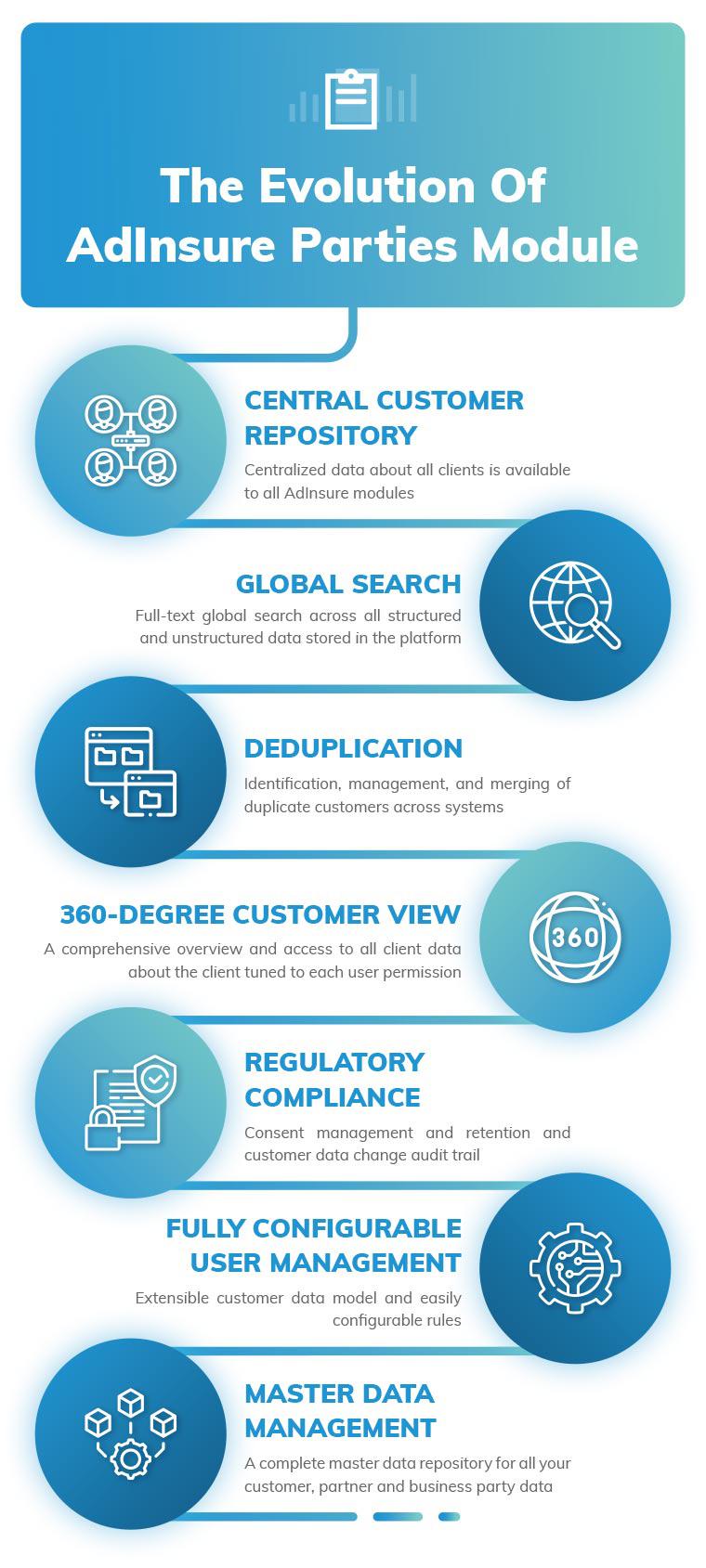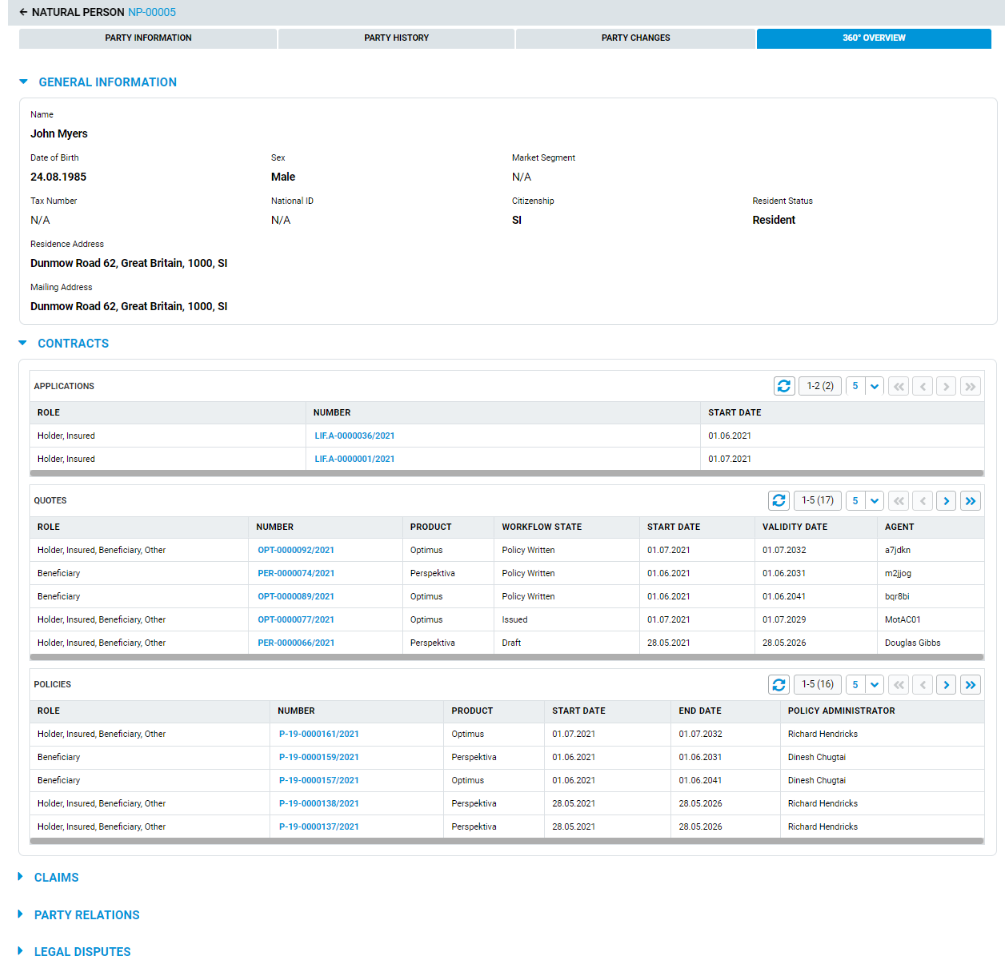
AdInsure’s best-kept secrets: Insurance Parties module, from a simple User Repository to a Master data system
When it comes to insurance solutions and platforms, the focus of discussions is always on new business submission, policy administration, claims, and billing. However, what makes a solution really great are the additional functionalities that drive value beyond productivity and operational efficiency.
One of these features in AdInsure is the Parties module. In a nutshell, the Parties module helps you manage data, profiles, and interactions with your customers, partners, users, and service providers. This blog will focus on customer-related features to highlight the evolution of our solution and the benefits it brings.
Let’s look at the history of this unique module.
Table of Contents:
How the Parties module came to be
The evolution of the Parties module is a direct result of our product-focused strategy. In the past, AdInsure’s development process used to rely heavily on our clients’ needs, responding to their requirements and wishes. However, over time, we shifted our approach towards a strategic product roadmap covering the whole platform portfolio and incorporating future market needs. This approach allows us to stay one step ahead of our customers and anticipate their needs regarding core insurance systems and platforms.
The evolution of our Parties module perfectly encapsulates this shift, growing from a supporting product into a central and sophisticated component that delivers true business value.
What is AdInsure Parties?
The Party module allows clients to define and manage customers and then use their data wherever necessary – in the policy conclusion process, claim handling, or billing and collection. Insurers can define different party types ranging from customers to business partners and register or de-register individual parties. Deduplication and smart merging features help insurance carriers manage and clean their data to keep a single version of the truth.
It is also the central repository of this data and provides basic CRM features and even options for consent management for GDPR compliance. This means that clients have access to centralized and well-managed data available either within AdInsure or in other apps through an API.
Picture: The Evolution of AdInsure Parties Module
The early days
In the first generation of AdInsure, the Parties module was more of a side product of the development related to the core insurance processes. When a policy was concluded, the policyholder data needed to be entered, and there was no downside to saving it for later use. This feature made sure the system stored party data in a single place and made it accessible throughout the insurance processes – from identifying a policyholder as the claimant and finally as the recipient of compensation.
So why is a central party repository needed?
Having data in one location gives you more control and opens opportunities for improved analysis. It also removes the need for duplicate data and ensures data integrity and quality. Users don’t have to worry whether the data they’re looking at is current or if there exists a more recent version. There are also operational benefits of having a central data repository that doesn’t require management across multiple dashboards and tools.
Interestingly enough, a common parties repository that is integrated into all insurance business processes might not be a given for some clients. But for us, it wasn’t good enough. With our clients increasing portfolios, accelerated digitalization in the insurance industry, and growing diversity in our clients’ requirements, our party registry was due for an upgrade.
Find me, if you can, with Global Search
Of course, a centralized data store comes with its own challenges. Clients soon encountered the challenge of finding a specific party in the repository. As data was centralized, data volumes in the system began growing, and users needed a quick and easy way to identify parties without defining multiple search criteria.
It often happened that users created duplicate parties because it was sometimes easier than finding an existing one. This duplicate data comes with a slew of issues. How would you know what benefits belong to a party if you do not have all policies mapped to a single entity? How do you manage your data if it is dispersed across the entire system (or even systems) without a single version of the truth?
The first step to solving this issue was introducing global search.
Global search is a search feature that uses the Elasticsearch search engine for distributed, multitenant-capable full-text search. Though it was first used for party search, today, the Global search is the default option used throughout all AdInsure modules.
We went from creating custom party search user interfaces for each of our clients to offering them a single global search that carries out a full-text search across all indexed attributes.
In practice, when a call center employee is trying to find an insurance policy using just the caller's name, the general search returns all policies where the caller is mentioned – either as a policyholder, a beneficiary or the insured party. This makes it much easier to find information in your core system, regardless of where it’s stored, giving you great flexibility in your customer interactions.
Find your twins with deduplication
Global search only solved one part of the challenge, though.
We were still facing the issue of duplicate entries for single entities. This is something that happens often and can result in numerous issues; it makes it challenging to have a single customer view, reduces the effectiveness of your customer service, and decreases your productivity.
We responded by adding the deduplication feature. Deduplication is a set of functionalities that identifies, manages, and merges duplicate parties in the system. The initial step is defining what a duplicate is. The same name and a surname do not guarantee parties are duplicates. To make sure, we focused on unique identifiers, such as tax ID.
Once you have your duplicates, you need to decide whether you will merge, delete or keep them. We used to leave it up to users but have managed to automate it in recent versions to ensure our clients do not lose their data during deduplication. All policies and documents are merged and appended to one party.
Getting a 360-degree view
Once you have your party data searchable and deduplicated, you can finally trust your data. Essentially this means that once your sales or customer service agent looks up a party, they get all the information they need in one place.
360-degree view means that you can view and access all the data in your system from a single place – all general and personal information, every policy and claim, balance accounts and invoice data, legal disputes, complaints, even relation to other parties you are interacting with.
All this while ensuring the highest levels of information security. Only the roles with appropriate permission are able to access the information preventing data leaks and abuse. The solution is compliant with personal data protection regulations and allows insurers to define and monitor audit trails to control how users consume and access customer personal data.

Regulatory compliance
This data repository means that AdInsure is storing a vast amount of personal data – from the party details to policy information and last but not least claim payment details and billing documents.
In accordance with the EU General Data Protection Regulation (GDPR), insurance companies now needed explicit consent from their customers to process this data. Before we could turn our Parties module into a core CRM system, we needed to create an out-of-the-box approach for personal data management, retention and removal.
We responded by adding the Consents module which offers explicit consent management, ensuring transparency on the handling and use of personal data the party has agreed to when signing the documents.
Before we could start planning the nice to have but not necessary improvements to the existing features, the GDPR forced our hand and the first priority was to offer our clients features for achieving GDPR compliance. The Parties module also provides audit logs by automatically logging updates to individual party details, with the information about when it was done, by whom and to what extent.
Everything can be tuned
At Adacta we are dedicated to making our systems fully configurable, which means that you can set up each individual part of the Parties module to meet your specific needs. No coding required.
The following aspects are fully and easily configurable in AdInsure Studio:
- New party types can be defined to extend the types provided out of the box (natural person, legal entity)
- Configurable set of mandatory attributes
- National and regional controls can be added (for example when adding TAX ID)
- Data model and attributes of every party type
- Deduplication rules
- Consent documents
- 360-degree view
Ready for prime time
Through time and strategic investments, we grew our party module from an auxiliary module that served other modules into a central feature that provides rich master data management features that can integrate and unify data across systems.
In my experience, our clients increasingly want the core insurance system to come with functionalities that resemble CRM. While several of our client use separate CRM solutions, which can be easily integrated with AdInsure to take full advantage of CRM functionalities, many clients are not using a CRM solution and are not even planning in deploying one.
These are the cases covered by our Parties module. The latest version delivers core CRM features, such as the overview of personal information, sales opportunities, contracts, financial data, and claim statuses. This allows our clients to focus on their operations while also adding new customer-focused innovations into their business.
What a journey it’s been
As it is with any innovation, improvements are driven by demand, in our case either coming from the clients or from international and local regulation. As AdInsure grows so does our expertise and the ambitions that come with it. We are always on the lookout for new and exciting features, but at the same time, never forgetting the basics.
The Parties module has grown from a basic party registry to a powerful master data management system, proving that a strategic approach to product development can result in an overlooked module turning into a powerful system that delivers true value to our clients.
In short, even if you are an insurance company without a CRM system, you could use an insurance IT system that delivers CRM functionality on a core feature. Parties module will help you take your data and clean it so you can begin managing it comprehensively along with any consents required by regulations. This is a cornerstone for CRM features, such as 360-degree view of your clients that allows you to deliver exceptional customer service across your client base.





